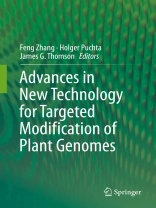Over the past 50 years, biotechnology has been the major driving force for increasing crop productivity. Particularly, advances in plant genetic engineering technologies have opened up vast new opportunities for plant researchers and breeders to create new crop varieties with desirable traits. Recent development of precise genome modification methods, such as targeted gene knock-out/knock-in and precise gene replacement, moves genetic engineering to another level and offers even more potentials for improving crop production. The work provides an overview of the latest advances on precise genomic engineering technologies in plants. Topics include recombinase and engineered nucleases-mediated targeted modification, negative/positive selection-based homologous recombination and oligo nucleotide-mediated recombination. Finally, challenges and impacts of the new technologies on present regulations for genetic modification organisms (GMOs) will be discussed.
Table of Content
Double-strand break repair and its application to genome engineering in plants.- Engineering meganuclease for precise plant genome modification.- High efficient genome modification by designed Zinc Finger Nuclease.- Engineered TAL effector proteins: versatile reagents for manipulating plant genomes.- Oligo-mediated targeted gene editing.- Gene targeting in crop species with effective selection systems.- Recombinase Technology for Precise Genome Engineering.- PBRM1: Developing CRISPR technology in major crop plants.
About the author
Feng Zhang, Research Director, Cellectis plant sciences
Holger Puchta, Professor, University of Karlsruhe
James Thompson, Principle Investigator, USDA












